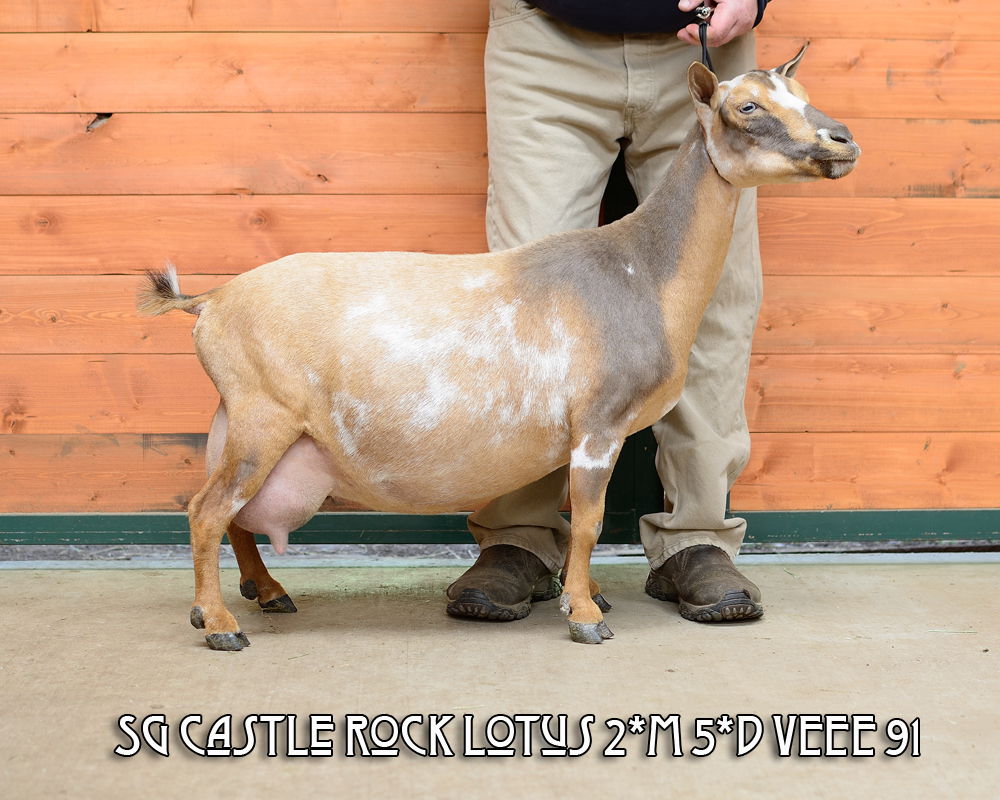
The Goats
The Nigerian Dwarf is an American miniature dairy goat breed. The breed descends from West African Dwarf goats originally imported to zoos in the United States. Nigerians ares a relative new-comer in comparison to some of the dairy goat breeds of European origin. The International Dairy Goat Registry (IDGR) was the first to recognize and register Nigerian Dwarf goats, with Bullfrog Alley’s Johnny Jump Up, on July 21, 1981.
When our farm was first established, the Nigerian Dwarf was still on the Conservation Priority list with the Livestock Breeds Conservancy. As their popularity grew, they were removed from the list in 2013. Although once considered to be relatively rare, Nigerians are now the fastest growing dairy goat breed registered with the American Dairy Goat Association (ADGA).
Our herd is founded primarily on Castle Rock, and Algedi Farm genetics. Our breeding emphasis is to select for correct dairy type animals with a strong capacity to milk, and a placid disposition. While members of the herd occasionally attend local dairy goat shows, our focus is toward proving our herd genetics through registry Dairy Herd Improvement (DHI) programs to assess production performance, and Linear Appraisal programs to evaluate structural correctness.
Nigerian Dwarf goats produce some of the richest, and most flavorful, milk of any dairy goat breed. Despite being small in stature, this breed is highly efficient, and can produce a remarkable volume of milk for its size. The sweet, rich milk is perfect for cheesemaking, yogurts, butter, and ice cream, and after the kids are weaned, we use the milk as a staple in our kitchen throughout the summer and winter months.


To ensure we retain high-yield components in the milk, all breeding age animals are DNA typed, and tested, to determine which alpha S1-casein alleles each animal is carrying. Although high casein alleles (A, and B, or some combination thereof) predominate in the breed, some weak casein alleles (E and F) have been identified in a few individuals in the breed, and as more animals are tested, more weak alleles may be uncovered in the future. Although we are at the point of rarely bringing in new outside genetics, all new animals are casein typed before being brought into our breeding program. We test to avoid inadvertent introduction of those weak alleles into the herd.
All milking does, including first fresheners, are milked twice daily throughout the length of their lactation. Priority for milk, however, goes to the kids born on the farm each season. All kids are bottle-raised, for a number of reasons, including farm efficiency, herd health, and to ensure kids are friendly, and well-socialized, before going to their new homes.
Once kids are weaned, surplus milk is used both in the farm kitchen, and to produce our handcrafted, small-batch, luxuriant goat milk soap.
With their winning, individual, and unique personalities, these small goats are a tremendous amount of fun to have around the farm. They are every bit as smart, and as affectionate, as dogs, albeit occasionally a little more mischievous.
In addition to helping us keep pasture fencelines clear, and devouring the rambling blackberry vines that grow prolifically here, they also produce some of the most incredible compost that we use in the orchard and gardens.
Kids sell quickly in the spring, so if you have an interest in a particular breeding, we recommend reserving the kid(s) of your choice in advance. Although we strive to keep the website current, you can contact us in advance to inquire as to availability for a particular reservation. We may also occasionally have a few select animals for sale, listed on the sales page.

Our goats are registered with the American Dairy Goat Association (ADGA), and the American Goat Society (AGS), and are eligible for registration with the Nigerian Dwarf Goat Association (NDGA).
We maintain a disease-negative herd, and test all members of our herd annually for CAE and CL. Fecal PCR testing for Johne’s disease is conducted through the California Animal Health and Food Safety (CAHFS) Laboratory at UC Davis. New additions to the farm are quarantined and tested when they arrive on the farm before being introduced to the herd. Our entire herd was last tested October 2019, and has always tested negative for CAE, CL, and Johne’s disease.
